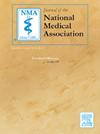Does Enhanced Cognitive Processing Therapy with Lifesteps Reduce HIV Stigma and PTSD
IF 2.3
4区 医学
Q1 MEDICINE, GENERAL & INTERNAL
引用次数: 0
Abstract
Background
People with HIV (PWH) report higher levels of trauma than the general population, with rates from 40 to 90%. Higher rates of traumatic exposure correspond with higher rates of Post-traumatic Stress Disorder (PTSD) in this population, with rates of PTSD in PWH estimated to be between 30 and 74%. Up to 64% of PLH endorse PTSD symptoms directly related to their HIV diagnosis. Our team recently enhanced Cognitive Processing Therapy (CPT), an evidence-based treatment for PTSD, with Lifesteps (L), an HIV medication adherence intervention, to create CPT-L to address PTSD and HIV outcomes.
The purpose of the current study is to report on preliminary HIV stigma and PTSD findings among a small sample participating in a pilot randomized controlled trial comparing CPT-L to Standard of Care (SOC).
Methods
PWH (N=41; Mean age=44.8; SD=12.3) who had experienced at least one traumatic event with current PTSD symptoms were recruited from local Ryan White HIV care clinics. Participants were randomized to receive CPT-L or SOC and completed validated assessments of PTSD and stigma at baseline and at 6-week post-baseline.
Results
Following 6-weeks of treatment, CPT-L participants showed significant decreases in PTSD (CAPS: CPT-L Δ=-17.7, SE=2.4 vs. SOC Δ=-6.2, SE=4.0; Cohen’s d=1.0). Males receiving CPT-L had a significantly greater decrease in PTSD as compared to females receiving CPT-L (Males-Δ=-25.3, SE=4.2 vs. Females-Δ=-8.6, SE=4.7; d=1.61) while the sex difference in the SOC group was null (d=0.06). Further, participants identifying as Black had significantly greater decreases in CAPS scores during treatment as compared to all other races (Black-Δ=-13.8, SE=2.8 vs. All Others-Δ=-6.0, SE=3.9; d=0.65). Changes in stigma total score from baseline to week 6 reached a Cohen’s d of .97 within the CPT-L group but the between group difference was not significant (Δ=6.22, SE=5.55, Cohen’s d=0.43, p=.273).
Conclusions
The results suggest CPT-L can be used as a tool to reduce HIV stigma and PTSD in PWH, particularly among males and Black people. Clinical implications and future research directions should explore ways in which physicians who work with PWH can best intergrate CPT-L into their practices to promote a larger scale impact in the reduction of PTSD and HIV stigma, and ultimately improve HIV health outcomes.
增强认知加工治疗与生活步骤减少HIV耻辱和创伤后应激障碍
艾滋病毒感染者(PWH)报告的创伤程度高于一般人群,发生率从40%到90%不等。在这一人群中,较高的创伤性暴露率与较高的创伤后应激障碍(PTSD)发病率相对应,据估计,PWH患者的PTSD发病率在30%至74%之间。高达64%的PLH患者认可与其HIV诊断直接相关的PTSD症状。我们的团队最近加强了认知处理疗法(CPT),一种基于证据的PTSD治疗方法,与Lifesteps (L),一种HIV药物依从性干预,创造了CPT-L来解决PTSD和HIV的结果。本研究的目的是报告参与一项比较CPT-L和标准护理(SOC)的小样本随机对照试验的初步HIV耻辱和PTSD发现。方法从当地Ryan White HIV护理诊所招募至少经历过一次创伤性事件并有PTSD症状的spwh (N=41,平均年龄=44.8,SD=12.3)。参与者随机接受CPT-L或SOC,并在基线和基线后6周完成PTSD和病耻感的有效评估。结果治疗6周后,CPT-L受试者PTSD显著降低(CAPS: CPT-L Δ=-17.7, SE=2.4 vs. SOC Δ=-6.2, SE=4.0; Cohen’s d=1.0)。与接受CPT-L治疗的女性相比,接受CPT-L治疗的男性PTSD发生率显著降低(男性-Δ=-25.3, SE=4.2 vs.女性-Δ=-8.6, SE=4.7; d=1.61),而SOC组的性别差异为零(d=0.06)。此外,与所有其他种族相比,黑人参与者在治疗期间的CAPS分数显著下降(黑人-Δ=-13.8, SE=2.8 vs.其他所有人-Δ=-6.0, SE=3.9; d=0.65)。从基线到第6周,病耻感总分的变化达到科恩d。CPT-L组内共97例,组间差异无统计学意义(Δ=6.22, SE=5.55, Cohen’s d=0.43, p= 0.273)。结论CPT-L可作为减少PWH患者,尤其是男性和黑人患者的HIV污名和PTSD的工具。临床意义和未来的研究方向应该探索如何让治疗PWH的医生将CPT-L整合到他们的实践中,以促进在减少创伤后应激障碍和艾滋病毒污名方面产生更大的影响,并最终改善艾滋病毒的健康结果。
本文章由计算机程序翻译,如有差异,请以英文原文为准。
求助全文
约1分钟内获得全文
求助全文
来源期刊
CiteScore
4.80
自引率
3.00%
发文量
139
审稿时长
98 days
期刊介绍:
Journal of the National Medical Association, the official journal of the National Medical Association, is a peer-reviewed publication whose purpose is to address medical care disparities of persons of African descent.
The Journal of the National Medical Association is focused on specialized clinical research activities related to the health problems of African Americans and other minority groups. Special emphasis is placed on the application of medical science to improve the healthcare of underserved populations both in the United States and abroad. The Journal has the following objectives: (1) to expand the base of original peer-reviewed literature and the quality of that research on the topic of minority health; (2) to provide greater dissemination of this research; (3) to offer appropriate and timely recognition of the significant contributions of physicians who serve these populations; and (4) to promote engagement by member and non-member physicians in the overall goals and objectives of the National Medical Association.

 求助内容:
求助内容: 应助结果提醒方式:
应助结果提醒方式:


